No 10 says Cameron has secured EU vote over Juncker
- Published
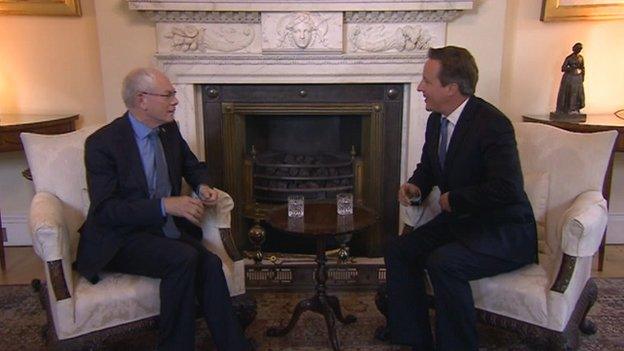
David Cameron had a brief meeting with Herman Van Rompuy at No 10
David Cameron has won agreement for a vote on the future president of the European Commission, No 10 has said.
It follows "a full and frank" meeting with European Council president Herman Van Rompuy in Downing Street.
Mr Van Rompuy "agreed to work through how a vote would proceed", No 10 said, ahead of Friday's summit of EU leaders.
The British prime minister told the EC president that the appointment of Jean-Claude Juncker would "politicise and compromise" the European Commission.
Mr Cameron has insisted that if Mr Juncker's name was tabled at Friday's meeting, he would demand an "unprecedented" vote on his nomination to demonstrate the level of opposition to it.
He told reporters ahead of the meeting with Mr Van Rompuy that the UK was not alone on the issue.
'Irreversible step'
"I know there are many other heads of state and governments in Europe who don't like this process that has come about; who don't think that this is the right person to lead reform in Europe," he said.
"I'm going to do what I said I would do and oppose this process and oppose this person.
"Other people will have to make up their mind whether to do what their heart and head tells them or not."
During their meeting, Mr Cameron told Mr Van Rompuy that appointing Mr Juncker would "ignore the clear pro-change and pro-reform message" delivered by European voters in last month's European elections.
In a statement released after the meeting, No 10 said that accepting the former Luxembourg prime minister would be "an irreversible step which would hand power from the European Council to the European Parliament" and "end the decades-long practice of always finding a candidate by consensus".
It added: "The prime minister asked President Van Rompuy to prepare the European Council for a vote on Mr Juncker's nomination, should the European Council choose to depart from a consensus-led approach when it meets this week. President Van Rompuy agreed to work through how a vote would proceed."
However, with the majority of EU leaders - including Germany's Angela Merkel - backing Mr Juncker's candidacy, Mr Cameron's bid is likely to end in failure.
Radek Sikorski, Polish FM: "The largest party gets the top job"
The row over Mr Juncker hit the headlines a few weeks ago when Mr Cameron reportedly warned that the UK could leave the EU if he became president of the European Commission - the body which drafts EU laws.
Mr Cameron wants a delay in the process in an effort to find a consensus candidate, but if his fellow 27 EU leaders are not even willing to consider alternatives to Mr Juncker, he will seek to call a vote and require them to set out their positions clearly.
'Credibility'
But UKIP leader Nigel Farage questioned why Mr Cameron had "gone headlong into a fight" over Mr Juncker that "he was always going to lose".
"In terms of his own credibility with the British public, it makes his argument that he is going to get a better deal for Britain look very remote," he said.
Mr Cameron, who wants to renegotiate the terms of the UK's membership of the EU, wants a reformer to take charge, whereas Mr Juncker is seen by some as a politician with an instinct for ever-closer European integration.
The responsibility for proposing a new president lies with Mr Cameron's 27 fellow heads of government, in a grouping called the European Council.

Jean-Claude Juncker: The numbers game
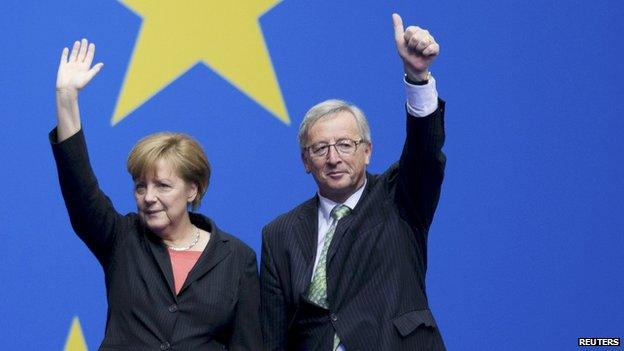
The German chancellor has given Jean-Claude Juncker her backing
EU leaders split over whether Jean-Claude Juncker can drive the changes many want in the EU
Mr Juncker seen as traditional Brussels "insider" by UK - some other EU leaders also against him
Germany's Chancellor Merkel backs Mr Juncker - but stresses that leaders must agree on EU priorities first
In anti-Juncker camp, UK PM David Cameron appears to have Netherlands, Sweden and Hungary as allies
UK hopes of support from Italy - which has sizeable voting weight - have been dashed
Juncker also needs European Parliament approval
Parliament says Mr Juncker is first choice as his centre-right European People's Party (PEP) bloc won election and leaders must take account of result
But Mr Juncker would need 376 votes in 751-seat parliament - not clear he could get that
Mr Juncker would get support of EPP and Liberals, but big Socialist bloc looks split and many other MEPs would oppose him

But under new rules, they must now take into account the results of the recent European Parliament elections.
The largest grouping after those elections was the centre-right European People's Party (EPP), which had chosen Mr Juncker as their candidate for the post.
Both the Labour leader Ed Miliband and Nick Clegg, the Liberal Democrat leader, have also said they do not want Mr Juncker to be the next leader of the commission.
'Leadership, not excuses'
Labour has called for "leadership not excuses" from the prime minister.
But on Saturday, Mr Juncker received the backing of nine left-wing heads of government.
Speaking on their behalf, the President of France, Francois Hollande, said it was important to respect the spirit of the European parliament elections.
Germany's Chancellor Angela Merkel has also backed Mr Juncker's bid and he also has support from other conservative leaders.
Mr Juncker was prime minister of Luxembourg from 1995 to 2013 and one of the architects of the euro.
He is a strong advocate of a European "solidarity" union - an EU that strives to raise living standards in its poorest regions and sectors.
Poland's foreign minister, Radek Sikorski said if the Conservatives had still been part of the EPP Mr Cameron could have made his anti-Juncker argument "when EPP chose its candidate and he may well have prevailed".
The Conservatives left the EPP in 2009, fulfilling a pledge Mr Cameron made during his 2005 Conservative leadership election. He said the EPP's federalist views were at odds with Tory views,
- Published23 June 2014
- Published23 June 2014
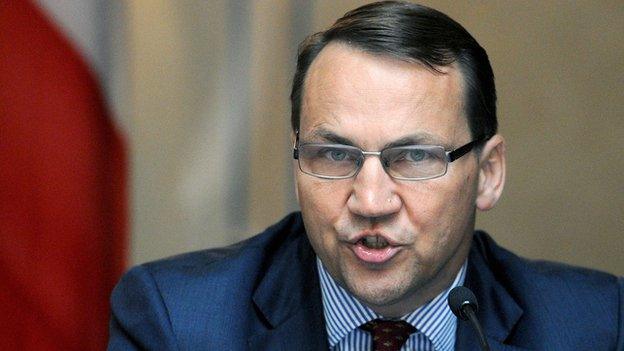
- Published15 July 2014
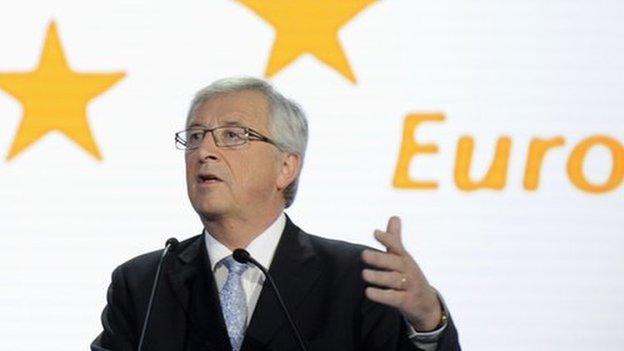
- Published22 June 2014
- Published21 June 2014
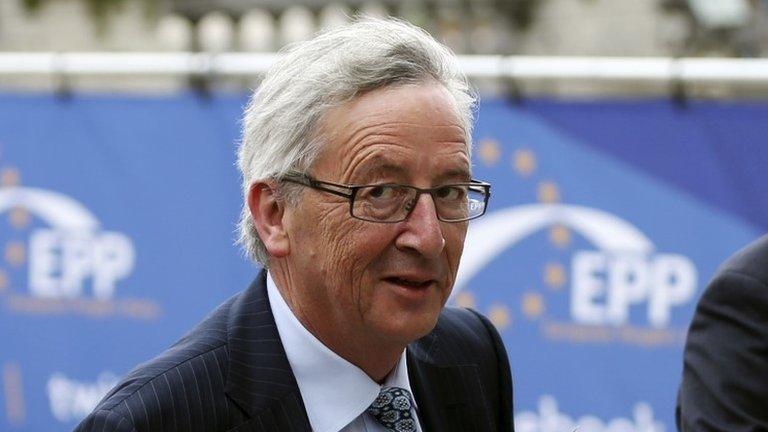
- Published27 May 2014
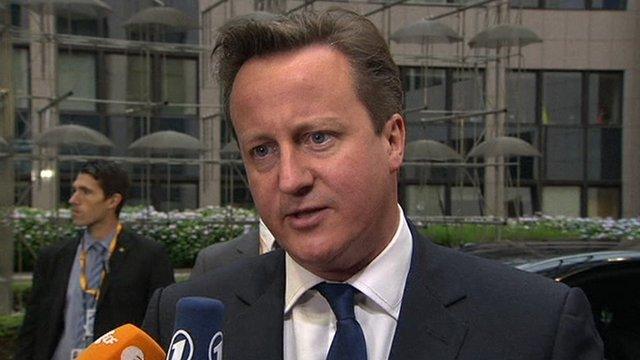
- Published16 June 2014